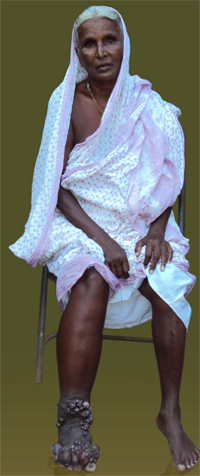Lymphatic Filariasis: Indumati’s Story
 Before becoming involved with one of India’s programs that help people with lymphatic filariasis (LF) manage their symptoms, Indumati was one of the millions of LF patients with little hope that her pain, social isolation, and disfigurement would ever improve. A native resident of Orissa, India, Where nearly half of the population has LF, Indumati is a 58-year-old widow and mother of seven.
Before becoming involved with one of India’s programs that help people with lymphatic filariasis (LF) manage their symptoms, Indumati was one of the millions of LF patients with little hope that her pain, social isolation, and disfigurement would ever improve. A native resident of Orissa, India, Where nearly half of the population has LF, Indumati is a 58-year-old widow and mother of seven.
She has been suffering from lymphedema (swelling) of the leg due to LF for almost 25 years. Treatment medications, doctor visits, and traditional healing efforts did little to alleviate the extensive swelling and lesions on her right leg. She was unable to work or to walk, and was “ashamed and scared to go out of [her] village.” Indumati was even afraid to visit her daughters, for fear they would be frightened in reaction to her disease. Her sons lived separately because “they [feared] their children might get affected by the disease.”
LF is one of the world’s most stigmatizing and debilitating diseases. More than 120 million men and women have LF, and another 1.3 billion are at risk of acquiring the infection. Symptoms of the disease are severe and painful, including swelling of the arms, legs, and breasts (called lymphedema) or the scrotum (called hydrocele). Another consequence of LF is that many people affected by the disease are shunned by their communities. In pain, often unable to work, and rejected by the people around them, people with LF are isolated and left with little hope.
To combat the consequences of LF like those Indumati describes, the United States Agency for International Development works in collaboration with the Centers for Disease Control and Prevention (CDC) and non-governmental organizations (NGOs). By partnering with NGOs like IMA World Health and India’s Church’s Auxiliary for Social Action (CASA), the groups are able to help patients like Indumati live with LF, in addition to helping to prevent new infections. This work highlights one of the major efforts of the Global Health Initiative and makes progress toward the World Health Organization’s target to eliminate LF globally by 2020.
CDC plays an important role in the global fight against LF, by offering guidance on how to improve mass drug administration (MDA) campaigns. These campaigns consist of offering medication to at-risk populations annually, to stop the spread of infection. However, challenges distributing the medication exist, especially in Indumati’s home state. CDC has identified ways to combat these challenges by first determining why people do not take the medicines. CDC found that by tailoring messages surrounding the importance of complying with recommended medication schedules, more people took the pills.
Now that CASA has started a lymphedema management program in Indumati’s village, local health workers teach community members about LF,including raising awareness of lymphedema prevention and treatment. In this setting, lymphedema management and treatment for LF have been shown to improve compliance with MDA and contribute to prevention of new infections. Thus, they are helping break the cycle of transmission. Management of LF includes washing affected areas with water and soap in addition to regular exercise of affected limbs. These simple steps help to prevent acute attacks of LF, even decreasing them by one third and adding a month more of ability to work each year.
Since health care workers have helped Indumati learn these techniques, she no longer suffers from acute attacks and the swelling in her leg has decreased. Indumati reports that she feels better, and is leading a more normal life. “Because of [CASA] now I am able to lead a better life. Now my grandchildren come to me without any hesitation,” Indumati reported joyfully.
- Page last reviewed: January 2, 2015
- Page last updated: January 2, 2015
- Content source:
Global Health
Notice: Linking to a non-federal site does not constitute an endorsement by HHS, CDC or any of its employees of the sponsors or the information and products presented on the site.


 ShareCompartir
ShareCompartir